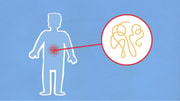Warning: Deadly disease spreading to dogs. Here's what you need to know to keep your pet safe
By
- Replies 6
As we move further into spring, now is the time to start thinking about tick season and how to protect your beloved furry friend from these potentially deadly pests.
Tick season runs from September to May in Australia, and during this time vets see a sharp increase in the number of dogs being rushed to hospital with tick bites.
Since it was discovered this year in Queensland, dog owners have been on high alert for ehrlichiosis, a deadly bacteria spread by brown ticks.
During tick season last year, the disease first occurred in Western Australia; however, it has subsequently been discovered for the first time in some areas of Queensland.
According to Dr Karishma Dahia, a veterinarian with the Animal Welfare League, there's a genuine potential that it may spread to all parts of Australia, which is why it is so crucial to maintain tick prevention measures.
'Because of the risk of it potentially going undetected, there is a real risk of it being spread through the dog population,' she said.

In Australia, the tick season lasts from September to May, and during this period, veterinarians notice a substantial rise in the number of dogs being sent to the hospital with tick bites. Credit: Antonio_Diaz/Getty Images/iStockphoto.
New statistics from the Australian Paralysis Tick Advisory Panel also suggested that only 48 per cent of dogs in paralysis tick-prone regions in Australia are protected against ticks.
In the previous two years, this fell by 5 per cent.
Additionally, around 10,000 pets are hospitalised each year with tick bites – an average of one every 20 minutes.
Sadly, not all of these animals make it home again. Ticks are responsible for the deaths of hundreds of dogs every year in Australia.
Ticks are carriers of many diseases that can be fatal to humans and animals if left untreated.
It's crucial that you know how to spot them on your dog and what signs to look out for if they've been bitten.
It is also worth noting that while veterinarians advise all dog owners to make sure their pets are safeguarded regardless of where they live, some regions are more at risk than others.
Ticks are commonly found in areas close to dense vegetation, along rivers, or on the shore, eg. close to national parks.
According to NexGard Spectra Australia, there are distinct places along the nation's east coast where paralysis and bush ticks are a problem.
A large portion of the eastern states of the nation, including NSW, QLD, VIC, NT, and SA, are regarded as hotspots for brown ticks.
Additionally, some parts of the coast of Western Australia are also thought to be brown tick hotspots.
So, if you're worried that your dog might've gotten bitten by a tick, here are some tips for how to check:
1. Feel for any lumps by gently running your fingertips along the coat at the level of the skin.
2. Check between and under the toes as you move down the front legs to the paws, starting at the head and neck and paying special attention to the mouth and ears. Check the back legs, tail, back, belly, and chest.
3. Check underneath the collar to see if there are any ticks there before removing it.
We love our pets. They bring us joy, companionship, and unconditional love. In return, we want to make sure they are happy and healthy at all times. That's why we ensure to provide them with the best possible care, including regular check-ups and preventive screenings. By doing all of this, we can help our furry friends enjoy long, happy, and healthy lives.
So, there you have it, folks! Feel free to share this article with your friends and loved ones who own dogs so they can be best informed about the threats posed by tick season.
Tick season runs from September to May in Australia, and during this time vets see a sharp increase in the number of dogs being rushed to hospital with tick bites.
Since it was discovered this year in Queensland, dog owners have been on high alert for ehrlichiosis, a deadly bacteria spread by brown ticks.
During tick season last year, the disease first occurred in Western Australia; however, it has subsequently been discovered for the first time in some areas of Queensland.
According to Dr Karishma Dahia, a veterinarian with the Animal Welfare League, there's a genuine potential that it may spread to all parts of Australia, which is why it is so crucial to maintain tick prevention measures.
'Because of the risk of it potentially going undetected, there is a real risk of it being spread through the dog population,' she said.
In Australia, the tick season lasts from September to May, and during this period, veterinarians notice a substantial rise in the number of dogs being sent to the hospital with tick bites. Credit: Antonio_Diaz/Getty Images/iStockphoto.
New statistics from the Australian Paralysis Tick Advisory Panel also suggested that only 48 per cent of dogs in paralysis tick-prone regions in Australia are protected against ticks.
In the previous two years, this fell by 5 per cent.
Additionally, around 10,000 pets are hospitalised each year with tick bites – an average of one every 20 minutes.
Sadly, not all of these animals make it home again. Ticks are responsible for the deaths of hundreds of dogs every year in Australia.
Ticks are carriers of many diseases that can be fatal to humans and animals if left untreated.
It's crucial that you know how to spot them on your dog and what signs to look out for if they've been bitten.
It is also worth noting that while veterinarians advise all dog owners to make sure their pets are safeguarded regardless of where they live, some regions are more at risk than others.
Ticks are commonly found in areas close to dense vegetation, along rivers, or on the shore, eg. close to national parks.
According to NexGard Spectra Australia, there are distinct places along the nation's east coast where paralysis and bush ticks are a problem.
A large portion of the eastern states of the nation, including NSW, QLD, VIC, NT, and SA, are regarded as hotspots for brown ticks.
Additionally, some parts of the coast of Western Australia are also thought to be brown tick hotspots.
So, if you're worried that your dog might've gotten bitten by a tick, here are some tips for how to check:
1. Feel for any lumps by gently running your fingertips along the coat at the level of the skin.
2. Check between and under the toes as you move down the front legs to the paws, starting at the head and neck and paying special attention to the mouth and ears. Check the back legs, tail, back, belly, and chest.
3. Check underneath the collar to see if there are any ticks there before removing it.
We love our pets. They bring us joy, companionship, and unconditional love. In return, we want to make sure they are happy and healthy at all times. That's why we ensure to provide them with the best possible care, including regular check-ups and preventive screenings. By doing all of this, we can help our furry friends enjoy long, happy, and healthy lives.
So, there you have it, folks! Feel free to share this article with your friends and loved ones who own dogs so they can be best informed about the threats posed by tick season.







